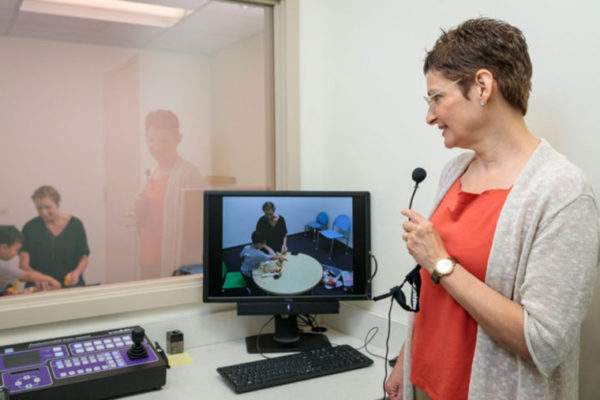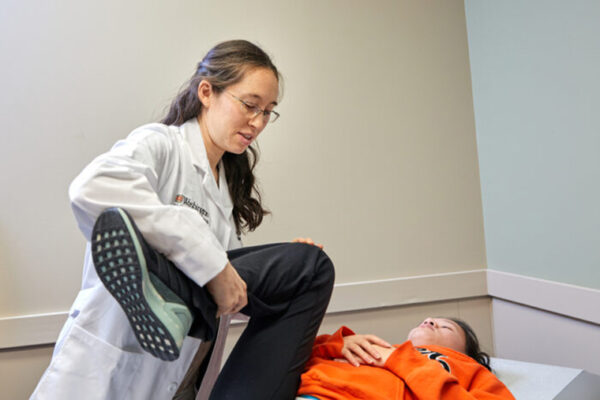After two years of wearing layers of protective equipment on crowded hospital floors and working shift after shift with COVID-19 patients, many front-line health-care workers are suffering burnout, anxiety, depression and other difficulties. Consequently, many have left the field or started to question whether to remain.
Reducing burnout and promoting mental health and wellness among health-care workers are the aims of a grant researchers at Washington University School of Medicine in St. Louis have received to help improve retention of such workers as hospitals and other health-care centers are faced with critical staffing shortages.
The grant, from the Health Resources and Services Administration of the U.S. Department of Health and Human Services, is one of 45 grants totaling $103 million awarded to improve conditions for health-care workers exhausted from the pandemic. The three-year, nearly $3 million grant to Washington University researchers is one of 10 awards designed to promote resilience by addressing health-care workers’ mental health needs.
“We want to increase the adaptive help-seeking skills of health-care workers,” said principal investigator Ginger E. Nicol, MD, an associate professor of child psychiatry. “The goal is to get to a place where health-care workers feel comfortable talking about their mental health. Health-care workers often experience burnout, anxiety or depression, and that has been exacerbated by the pandemic, but — pandemic or not — doctors, nurses, residents and others need to know how to access services that we should be providing anyway.”
The researchers plan to use mobile health and web-based tools to evaluate health-care workers’ mental health. They intend to enroll 2,500 such workers in a six-month, fully remote study that will use online tools to conduct monthly assessments of workers and then generate personalized referrals to address their needs. This platform will deliver weekly messages to encourage health-care workers to improve self-care. Another goal of the project is to create policies that help destigmatize mental health help-seeking among health-care workers.
“In health care, we tend to value helping others before we help ourselves; even more, we view asking for help as a weakness,” said co-investigator Jessica Gold, MD, an assistant professor and director of wellness, engagement and outreach for the Department of Psychiatry. “COVID-19 has made us all aware that work takes a toll, but awareness does not equal help-seeking. We want to better understand this gap in the health-care community and address what is needed to make health-care workers feel safe and able to ask for help when they need it.”
Gold said COVID-19 has compounded rates of depression and anxiety among health-care workers, and the physical and emotional demands of treating patients during a long pandemic have exacerbated long-standing barriers to well-being in the workplace.
“For a variety of reasons, most workers do not make use of employer-provided wellness and mental health resources, and health-care workers are no exception,” said co-investigator Bradley A. Evanoff, MD, the Richard and Elizabeth Henby Sutter Professor of Occupational, Environmental, and Industrial Medicine and director of the Division of General Medical Sciences. “This project builds on existing studies and ongoing efforts to use digital technologies that provide individualized recommendations to improve mental health and wellness. We want to overcome some of the barriers that keep our colleagues from getting the help they need.”
Over the course of the pandemic, the research team has assessed COVID-related changes in the mental health of employees with a digital tool called the Employee Well-Being during Epidemic Response (EMPOWER) survey, as well as a follow-up study of employee wellness needs. Using those findings, the researchers plan to direct health-care workers to various evidence-based wellness resources — from employee assistance programs to mindfulness training — but mainly, the goal is to help those workers find and accept assistance when they may be burned out or depressed.
The COVID-19 pandemic has intensified issues that have long been a source of stress for front-line health-care workers, including lengthy shifts and having to care for large numbers of patients. A number of health systems have implemented programs targeting the mental health of health-care workers, but without adequate input from those workers and from decision-makers, the plans often fail and are seen by employees as too little, too late.
“That’s why the very first step of this project is a needs assessment,” Nicol said. “This new project builds on that work, and guided by feedback from employees, the platform will assess health-care worker well-being and direct users to the mental health resources most relevant to their needs. Health care is a high-stress environment, and we want to provide reliable tools to support resilience and find ways to encourage health-care workers to use them.”
This work is supported by the Health Services Resource Administration (HSRA) of the Department of Health and Human Services, grant number HSRA 22-110.
Washington University School of Medicine’s 1,700 faculty physicians also are the medical staff of Barnes-Jewish and St. Louis Children’s hospitals. The School of Medicine is a leader in medical research, teaching and patient care, and currently is No. 4 in research funding from the National Institutes of Health (NIH). Through its affiliations with Barnes-Jewish and St. Louis Children’s hospitals, the School of Medicine is linked to BJC HealthCare.



